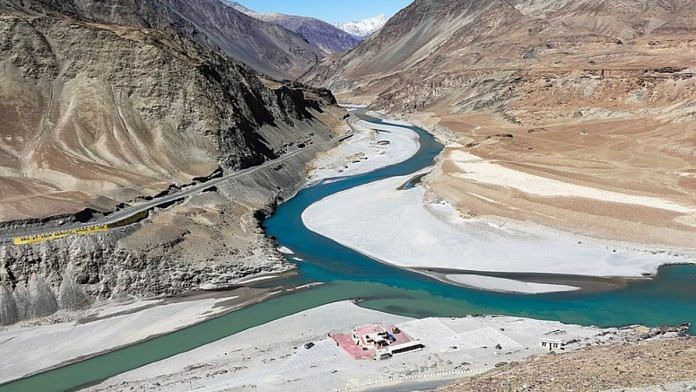New Delhi: Reiterating its stand to modify the Indus Waters Treaty – the cross border water sharing agreement brokered by World Bank between India and Pakistan in 1960 – India has sent a note verbale to Pakistan seeking a meeting of the water resources secretaries of the two countries to discuss the issue, ThePrint has learnt.
Sources within the government told ThePrint that India has also proposed a date – 15 July – for the meeting. Pakistan is yet to respond to India’s communication.
Two of them confirmed to ThePrint that the Ministry of External Affairs (MEA) has communicated to Pakistan in the first week of June to have a meeting at the level of water secretaries of the two countries.
ThePrint reached MEA spokesperson Arindam Bagchi to inquire if Pakistan has responded to the recent note verbale from New Delhi, but he did not provide a comment.
ThePrint also emailed the Pakistan foreign ministry spokesperson but did not receive a response. The report will be updated when they respond.
India had first shot off a notice to Pakistan on 25 January this year to renegotiate the treaty according to Article XII (3) of the Indus Water Treaty which mandates that the “provisions of this Treaty may, from time to time, be modified by a duly ratified treaty concluded for that purpose between the two Governments.”
Sources said that Pakistan had subsequently responded to the notice where it sought a meeting of the Permanent Indus Commission (PIC) comprising Indus Commissioners of India and Pakistan.
But India wasn’t agreeable to the idea of a meeting between the two commissioners.
One of the government sources cited above told ThePrint that the modification of the Indus Water Treaty cannot be discussed at the level of Permanent Indus Commission (PIC).
“Since we want to look at the treaty afresh, it is a government-to-government exercise and the meeting has to happen at the level of water resources secretaries of India and Pakistan. We have conveyed this to Pakistan,” the source said.
Also read: India-UAE vow to double non-petroleum trade to $100 bn by 2030, discuss rupee-dirham trade mechanism
Host of disputes
The Indus Waters Treaty spells out how the water of the eastern and western rivers on the Indus River Basin has to be divided between the two countries. While the water of the three eastern rivers – Ravi, Beas and Sutlej are allocated to India, water from the three western rivers – Indus, Jhelum and Chenab – are allocated to Pakistan.
India and Pakistan have been involved in a host of disputes over the two hydroelectric projects on the Indus river basin involving drawdown flushing for passing sediment downstream, and storage capacity of reservoirs among others. Three disputes related to Kishanganga, and four to the Ratle project.
India had objected to Pakistan unilaterally deciding to approach the court of arbitration (CoA) at Hague to resolve the issues.
While Pakistan wanted the CoA, India approached the World Bank to appoint a neutral expert to resolve the dispute. The World Bank had appointed a neutral expert on the request of India and chairman for the CoA, set up on the request of Pakistan, in October 2022.
India objected to the World Bank’s move to initiate the two parallel mediation processes simultaneously and refused to participate in CoA proceedings currently looking at the objections raised by Pakistan.
Under the treaty provisions, CoA consists of seven arbitrators , where two are appointed by India and Pakistan each. India has not appointed its two arbitrators so far.
The treaty has survived this far, notwithstanding three wars and several ups and downs in India-Pakistan ties. It came under strain after the 2016 attack on an army camp in Kashmir’s Uri where 19 Indian soldiers were killed by suspected Pakistani militants. The attack had led India to announce emphatically its decision to exercise its right to make full use of its share of water as specified in the IWT. (With inputs from Pia Krishnankutty)
(Edited by Smriti Sinha)
Also read: Why India’s SCO membership still matters as China strengthens its hand in Central Asia



